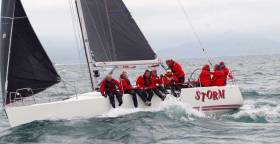Displaying items by tag: Welsh Nationals
2019 IRC Welsh Nationals Set For 9-11 August
Save the dates 9 to 11 August 2019 in your calendar for the Spinlock IRC Welsh National Championships, which promises a long weekend packed full of great racing and fun ashore
Once again the Welsh Nationals have been selected as the Welsh leg of the RC35 class Celtic Cup, won in 2018 by Irish boat Storm.
The Welsh National Sailing Academy and Events Centre in Pwllheli looks forward to welcoming sailors from across the UK and Ireland for racing in the world-renowned waters of Cardigan Bay, with the majestic backdrop of the mountains of Snowdonia and the rugged coastline of the Llyn Peninsula.
The championships will feature two separate race courses, one for the IRC fleets and Sportsboat class and a separate course for the Cruiser class, so there will be something for everyone.
The Notice of Race and entry form are now available online. IRC certificates are not required at this time, only basic details and general information about your boat.
All entries made before Thursday 31 January will be included in a super early-bird prize draw with Spinlock goodies to be won.
Events pontoons will once again be available for use before and during the championship without any additional charges. Book your space now in the entry form.
Berthing will also be available for boats competing in the ISORA race from Dun Laoghaire to Pwllheli on Saturday 27 July for those who wish to leave their boat in Pwllheli ready off the IRC Championships.
This year the camping facilities at the academy will be available for participants. Bring your campervan or caravan to set up your base camp right on the venue site. More details and online booking can be found on the Plas Heli website.
There will also be a limited number of bunk beds available on on a first come, first served basis. Details about this added facility will be circulated to entered boats first.
Organisers will arrange shore storage so that your delivery sails, life-rafts and associated gear can be stored for the duration of the event. Please indicate on the entry form if you would like shore storage.
And of course, there will be a full social programme ashore. Details will be circulated by e-newsletter and published on the official championship website in due course.





























































